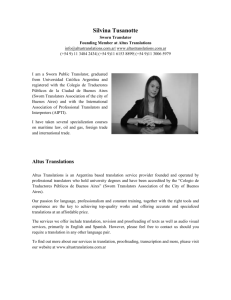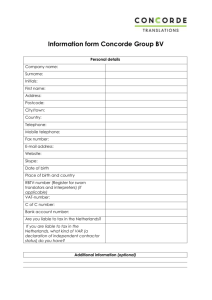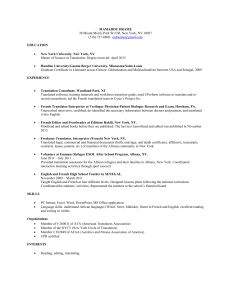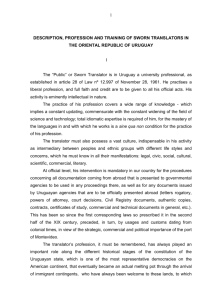The legal status of sworn translators
advertisement
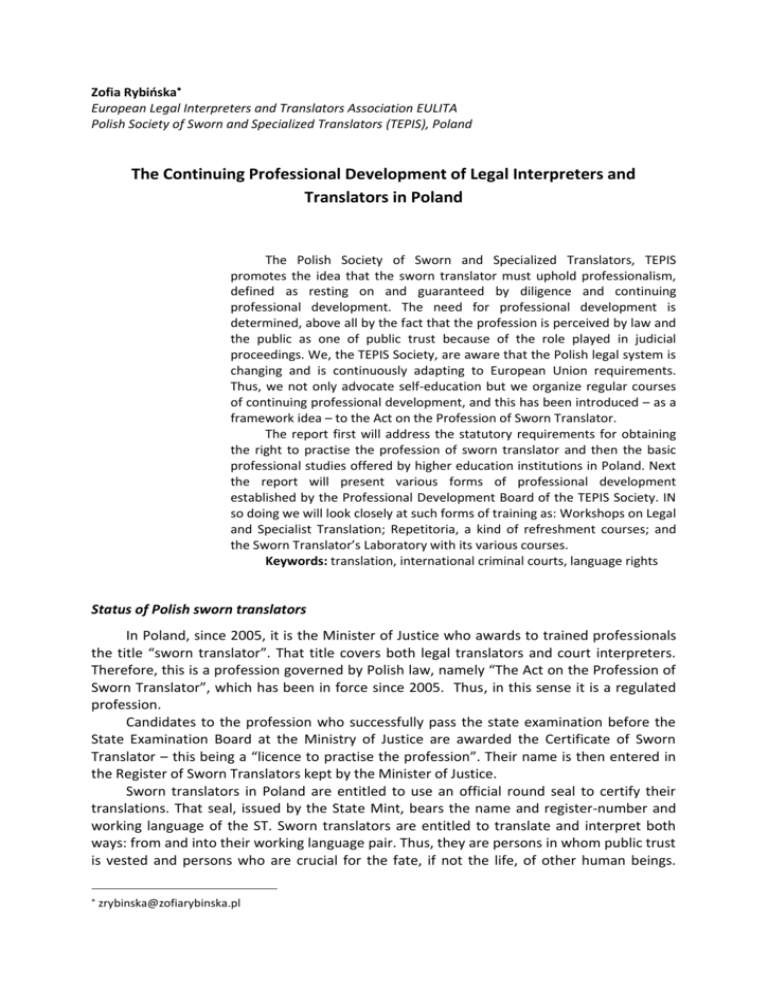
Zofia Rybińska European Legal Interpreters and Translators Association EULITA Polish Society of Sworn and Specialized Translators (TEPIS), Poland The Continuing Professional Development of Legal Interpreters and Translators in Poland The Polish Society of Sworn and Specialized Translators, TEPIS promotes the idea that the sworn translator must uphold professionalism, defined as resting on and guaranteed by diligence and continuing professional development. The need for professional development is determined, above all by the fact that the profession is perceived by law and the public as one of public trust because of the role played in judicial proceedings. We, the TEPIS Society, are aware that the Polish legal system is changing and is continuously adapting to European Union requirements. Thus, we not only advocate self-education but we organize regular courses of continuing professional development, and this has been introduced – as a framework idea – to the Act on the Profession of Sworn Translator. The report first will address the statutory requirements for obtaining the right to practise the profession of sworn translator and then the basic professional studies offered by higher education institutions in Poland. Next the report will present various forms of professional development established by the Professional Development Board of the TEPIS Society. IN so doing we will look closely at such forms of training as: Workshops on Legal and Specialist Translation; Repetitoria, a kind of refreshment courses; and the Sworn Translator’s Laboratory with its various courses. Keywords: translation, international criminal courts, language rights Status of Polish sworn translators In Poland, since 2005, it is the Minister of Justice who awards to trained professionals the title “sworn translator”. That title covers both legal translators and court interpreters. Therefore, this is a profession governed by Polish law, namely “The Act on the Profession of Sworn Translator”, which has been in force since 2005. Thus, in this sense it is a regulated profession. Candidates to the profession who successfully pass the state examination before the State Examination Board at the Ministry of Justice are awarded the Certificate of Sworn Translator – this being a “licence to practise the profession”. Their name is then entered in the Register of Sworn Translators kept by the Minister of Justice. Sworn translators in Poland are entitled to use an official round seal to certify their translations. That seal, issued by the State Mint, bears the name and register-number and working language of the ST. Sworn translators are entitled to translate and interpret both ways: from and into their working language pair. Thus, they are persons in whom public trust is vested and persons who are crucial for the fate, if not the life, of other human beings. zrybinska@zofiarybinska.pl Polish sworn translators bear statutory responsibility for their acts, and this makes them obligated to obey certain rules for translating that are established both by law as well as professional ethics and good practice. It is this very responsibility that makes the translator duty–bound to undergo continuing professional development and to be ever mindful of the need for translation of the utmost quality. Who may become a sworn translator in Poland? The Act on the Profession of Sworn Translator provides that not only Polish citizens may become sworn translators in Poland but also citizens of a European Union Member State, a European Free Trade Agreement Member State – the party to the Agreement on the European Economic Area. They must of course know the Polish language, have full capacity for acts in law, have a clean criminal record (as far as intentional offences, fiscal offences and unintentional offences against the safety of economic dealings are concerned). The examination may be taken only by holders of the magister degree, i.e., graduates of any second or long cycle programs of university departments [roughly an equivalent to MA degree]. Until July 1, 2011 non-linguists had to complete post-(magister) diploma studies in translation and interpreting, but this requirement was repealed with the aim of enabling people who have completed other than linguistic departments to become sworn translators. From the legislator’s point of view this amendment cleared access to the profession of sworn translator for non-linguists who speak less commonly used languages. But it drew criticism from legal professionals and the TEPIS Society. Deregulation process The Ministry of Justice, however, plans to go further in its deregulation process. [For your information- Poland is said to have too many regulated professions. A list of 200 professions has been determined with regard to which regulations have been considered excessive or unnecessary]. Therefore, we in Poland are experiencing a deregulation process aimed at eliminating obstacles that are purportedly hindering access to too many professions, including the profession of sworn translator. The planned move concerning sworn translators is to lower the level of required education, from the present magister degree to the certificate of secondary education. The TEPIS Society, in its formal position warned the Ministry about the wrongly understood elimination of limitations hindering access to the profession and pointed out it would suffice to give the Minister the right to give consent to a candidate who holds other than a magister degree to take the state examination in justified cases. As yet, the Ministry fortunately is not about to do away with the requirement of passing the state examination. Its passing rate is low, approximately 25 percent. It is difficult and demanding even for the holders of magister degree, and thus it is still a good filter and a tool for securing a well-qualified and responsible group of professionals. TEPIS also noted that the hitherto existing level of education is in conformity with the recommendations of the Reflection Forum on Multilingualism and Interpreter Training which established the professional profile of legal interpreters. These recommendations concerning the language proficiency of the candidates specify that the highest levels C1 and C2 should be required of legal interpreters. Such levels may be achieved predominantly at higher studies. Exceptions are allowed. The legal status of sworn translators In that light, the 2004 Act (obligatory as of 2005) was a milestone in the history of sworn translators in Poland, as it changed the legal status of Polish sworn translators, adding prestige to those practising the profession. The previously auxiliary function performed by sworn translators for the courts and law enforcement agencies was then upgraded to the profession of sworn translator. Naturally, the fact of raising the profession’s status won the applause of virtually all Poland’s sworn translators then. Unfortunately this greater prestige was not linked to an increase in translators’ fees, which were and still are considerably low for law enforcement bodies’ assignments. However, with the prestige came greater professional accountability for the acts, tasks, and duties performed by sworn translators. A system of penalties has also been introduced which includes admonition, reprimand, and suspension of the right to practise the profession for a period from 3 months to one year, as well as loss of the right to practise the profession of sworn translator, with the possibility of applying for obtaining the right again not earlier than 2 years after the loss was imposed and after the translator has successfully passed the examination again. Specialized education for sworn translators The Act seems to be a good piece of legislation. However, even the best such acts are not enough to ensure the high qualifications of professionals as required for the proper administration of justice. Adequate conditions must be created at higher education institutions for candidates wishing to become sworn translators to acquire the necessary knowledge, competence, and skills. Major Polish universities, like the Jagiellonian University (UNESCO Chair), University of Warsaw (Institute of Applied Linguistics), Adam Mickiewicz University in Poznań (Neo Philology Department), Maria Curie Skłodowska University in Lublin (Institute of Applied Linguistics) and three other HEIs train professional interpreters and translators, introducing to their curriculum courses in legal translation and interpreting. Very often, however, candidates for sworn translators still undergo post-(magister)-diploma courses in legal translation and interpreting. Such courses are offered by around 40 higher education institutions in Poland. Very often those higher education institutions are places where academics and experienced professionals meet and share their knowledge, experience, and competences. TEPIS and the university training for legal translators and court Interpreters Many years ago the TEPIS Society, which I represent, understood the need to bring together academics and experienced professionals. At the initiative of and in collaboration with the TEPIS Society, the Interdisciplinary Postgraduate Studies in Translation and Interpreting were established at the Institute of Applied Linguistics, University of Warsaw in 1998. The first school to offer such training in legal translation and court interpreting. The programme, proposed by experienced TEPIS sworn translators met the requirements stipulated in the Regulation on Examinations for Sworn Translators and gained recognition from academics. It has been operating ever since. Though the programme of the School is addressed mainly to non-philologists, it has gained popularity among philologists and linguists, as well. Members of TEPIS invited to teach legal translation alongside academics have been engaged in this work for fifteen years and have meaningfully contributed to the success of the School. This programme originally launched for the English/Polish language pair alone - nowadays is offered also for German, French, Italian, Russian, and Spanish as well. Arabic will be added this coming academic year. The School management is also thinking about devising a programme for the so- called rare languages (limited diffusion languages). By way of example let me give you the programme of the offered course of study. The training lasts 18 weekends during the academic year, 20 hours each weekend, thus a total 360 hours: The block of theoretical classes includes: Theory and practice of translation/interpreting - 20 hrs Basics of Polish law - 40 hrs Translator/Interpreter’s ethics and etiquette – 10 hrs Basics of the law of the B* language area - 40 hrs Court interpreting/translation methodology – 20 hrs Total: 130 hrs The bloc of practical classes includes: Translation/Interpreting workshops – 180 hrs Polish legal language stylistics - 20 hrs Legal B language discourse analysis - 20 hrs Methodology of legal translation/interpreting – 10 hrs Total: 230 hrs *B language –means the chosen one The most experienced TEPIS members are being invited to deliver lectures and provide their expertise in devising study programmes at universities in other Polish cities as well. TEPIS has signed cooperation agreements with the leading Polish universities, among them are: the University of Warsaw, the Jagiellonian University (of Krakow), the Adam Mickiewicz University (in Poznań), the University of Gdańsk, Nicolaus Copernicus Universitiy (in Toruń), the University of Warmia and Mazury (in Olsztyn). Those experienced TEPIS members run specialist lectures on the professional ethics of the translator, methodology of translation, and classes in legal translation/ interpreting under the auspices of TEPIS. Continuing Professional Development within TEPIS The Polish Society of Sworn and Specialized Translators, TEPIS promotes the idea that the sworn translator must uphold professionalism, which rests on and should be guaranteed by diligence and continuing professional development. The need for professional development is determined, among other things, by the fact that the profession is perceived by law and the public as a profession of public trust because of the role played above all in court proceedings. We not only advocate self-education, but we organize regular courses of continuing professional development, which has been introduced – as a framework idea – to the Act on the Profession of Sworn Translator (2005). Annual Workshops The Professional Development Board of the TEPIS Society has organized annual specialist workshops on Legal and Specialist Translation ever since 1991. They are always linked with the celebrations of St. Jerome’s Day, which is International Translator’s Day and are held on the last weekend of September or in early October. This year we will hold our 27th Workshop on the 5th of October. The Workshops used to be a two-day event, but recently they have been a one-day event. We start with a plenary session gathering all language groups - 3 hours and afterwards we split into language sessions in all language groups (3 hours) Invited academics and experienced members share their knowledge about relevant new developments or special translation issues. The day ends with a banquette called “A toast to St. Jerome”. Repetitorium In 2006 a new form of professional development was launched, called the ‘Repetitorium’ after the maxim Repetitio mater studiorum est. Repetitorium meetings are held in Warsaw every quarter and in other cities as organized by all the TEPIS Chapters. Repetitoria are a kind of refreshing workshop. Their formula includes a plenary gathering for all language groups during which an hour is devoted to Polish language issues, and another to the theoretical background of the topic assigned for the Repetitorium. Afterwards practical sessions are held in several language groups during which translation of documents or interpreting issues related to the topic are discussed. Laboratories Endeavouring to meet sworn translators’ needs, in 2008 we introduced yet another formula called the Sworn Translator’s Laboratory – a basic course, addressed both to candidates for the title of sworn translator and those already practising the profession. It lasted for three 8hour days, in total 24 hours. Polish was the working language. The curriculum covered lectures on the sworn translator’s legal status, the Code of the Sworn Translator, methodology of translation and court interpreting, information on the State examinations, practical information on taxes, the translator’s register, and other practical issues. Participants obtained a Certificate of Attendance. We used to have a course of training called the Laboratory for the Teachers of Status and Professional Ethics of the Sworn Translator“. This used to be an advanced, seminar style course, addressed to teachers of that subject at universities, likewise to experienced sworn translators who wanted to enrich their knowledge for their own benefit. It lasted 6 hours, was held over one day, and its participants obtained a Certificate of Attendance. Thematic Laboratories In March 2013 we offered specialist, thematic Laboratories addressed to professional translators: we successfully ran the Laboratory on “Financial English – easy or difficult” and “Tax language – easy or difficult? – each of which was a 4-hour meeting. The program of the second Laboratory covered the following issues: - Definition of Tax, - Canons of Taxation - Tax Functions and Its Evolution - Tax Systems - Tax Forms - Common Tax Mistakes - Tax Incentives - Tax Havens - Financial Sector Taxation - Tax Ordinance - Selected Terms - Double Taxation Treaties - Tax Slang - Tax Correspondence) - Tax Dictionaries, and -examples of texts about taxation from the Financial Times and the Wall Street Journal Similar Laboratories were organized by TEPIS Chapters and proved to be a success. However, another Laboratory: called “Workshop on Business Law and Property Law”, with oral presentations and role playing in English to be offered by Prof. James Hartzell failed to happen due to the small number of interested candidates or perhaps the prices which had to be paid by interested translators/interpreters. Laboratory for Candidates for the title of Sworn Translator and for Specialist Translators and Interpreters In 2010 the Professional Development Board of the TEPIS Society introduced a nine-month weekend course of training. It includes five (5) modules, totalling to 144 hours: Module 1. Profession of Sworn Translator - legal status and professional practice – 16 hrs. Module 2. Translation/Interpreting of official, legal and notarial texts – 36 hrs Module 3. Translation of economic and financial texts – 36 hrs Module 4. Court translation and interpreting - theoretical legal issues - 8 hrs; practical workshops – 40 hrs Module 5. Techniques assisting interpreting - 8 hrs TEPIS publications for CPD As above said the TEPIS Society advocates the continuing self-education of professional STs. To that end, TEPIS also endeavours to publish books and periodicals. Moreover, papers which are delivered during workshop meetings and at other events, including the International FIT Forums of Court Interpreting and Legal Translation which have been held in Poland. These papers are subsequently published in the form of proceedings and also in the form of articles in Lingua Legis, the renowned journal on legal translation and court interpreting. Under the auspices of TEPIS we have published a number of collections of parallel texts in English, German, French, Russian and Polish which provide a reference base for teaching, self education and the everyday practice of translating Polish documents into the respective languages. Professionalism and good quality In closing I would like to emphasize yet another point: namely, that professionalism and good quality do not come for free, nor without hard work and adequate investment. Sworn translators in Poland, and I believe the same holds true for LITs in every country, are all aware that languages change, systems of law and procedures change, and translators need to keep abreast of new developments in their area of specialization. In order to perform all the roles they are entrusted with in a reliable manner, that of sworn translators, jurilinguistic experts, experts in cultural diversity and authenticators to facts, sworn/legal/certificated translators must constantly refresh and develop their knowledge and skills. Nowadays, continuing professional development in Poland is left to sworn translators themselves. It would be most welcome if the Ministry of Justice understood the importance of CPD and could assist sworn translators and their associations in offering training. Quality must be well paid. Conscientious sworn translators constantly subject themselves to critical self–assessment in order to find out whether they are living up to the requirements of the profession. The Minister of Justice should not only keep the register of sworn/certified translators, but they should also assist those registered in updating their skills, acquiring more expertise and knowledge, in order to increase confidence and reliability. Updating of knowledge and skills is a must for legal professionals, like judges, prosecutors, advocates. CPD is mentioned as a translator's duty in the Sworn Translator's Act, but the Minister of Justice himself does not attend to that provision and does not feel responsible for its implementation. Instead of further deregulation, the Minister should endeavour not only to increase the existing deplorable fees, but also to find measures and devise a system that would stimulate quality translation and interpreting, or delegate that duty to associations of LITs.
